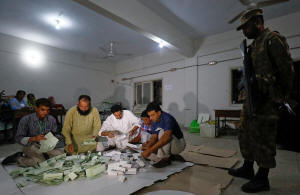|
The
resolution passed by the senate, however, is not binding and
does not necessarily mean elections will be further delayed.
There was no immediate comment from the election commission, the
body that conducts elections in the country.
Elections in the politically and economically troubled South
Asian nation were originally due to be held in November, 90 days
after the dissolution of the lower house of parliament in
August, but were first delayed to February due to the fresh
demarcation of constituencies under a new census.
"January and February are the coldest months in majority areas
in Balochistan and Khyber Pakhtunkhwa (provinces),” said
independent Senator Dilawar Khan, who moved the resolution
during a session with only 14 lawmakers in attendance, adding
that there were security concerns too.
Pakistan is currently being run by a caretaker government under
interim Prime Minister Anwaar ul Haq Kakar that is meant to
oversee a general election.
Caretakers are usually limited to overseeing elections, but
Kakar's set-up is the most empowered in Pakistan's history
thanks to recent legislation that allows it to make policy
decisions on economic matters.
The legislation is aimed at keeping on track the conditions for
a $3 billion International Monetary Fund (IMF) bailout secured
in June.
Political analysts fear that a prolonged period without an
elected government would allow the military, which has ruled
Pakistan for over three decades since independence in 1947 and
wields considerable control even if not in power, to consolidate
control.
(Reporting by Ariba Shahid, writing by Sakshi Dayal; Editing by
Toby Chopra and Raju Gopalakrishnan)
[© 2023 Thomson Reuters. All rights
reserved.]
Copyright 2022 Reuters. All rights reserved. This material may
not be published, broadcast, rewritten or redistributed.
Thompson Reuters is solely responsible for this content.

|
|




